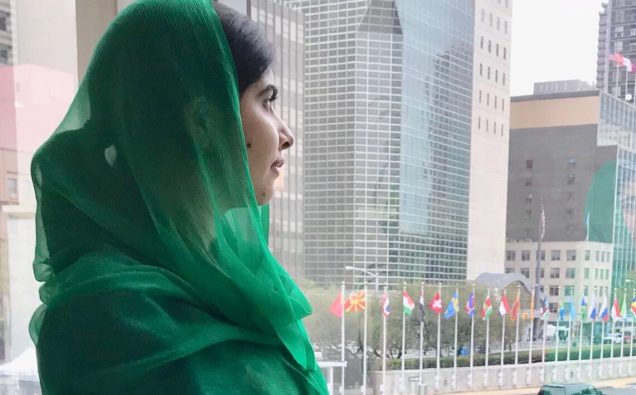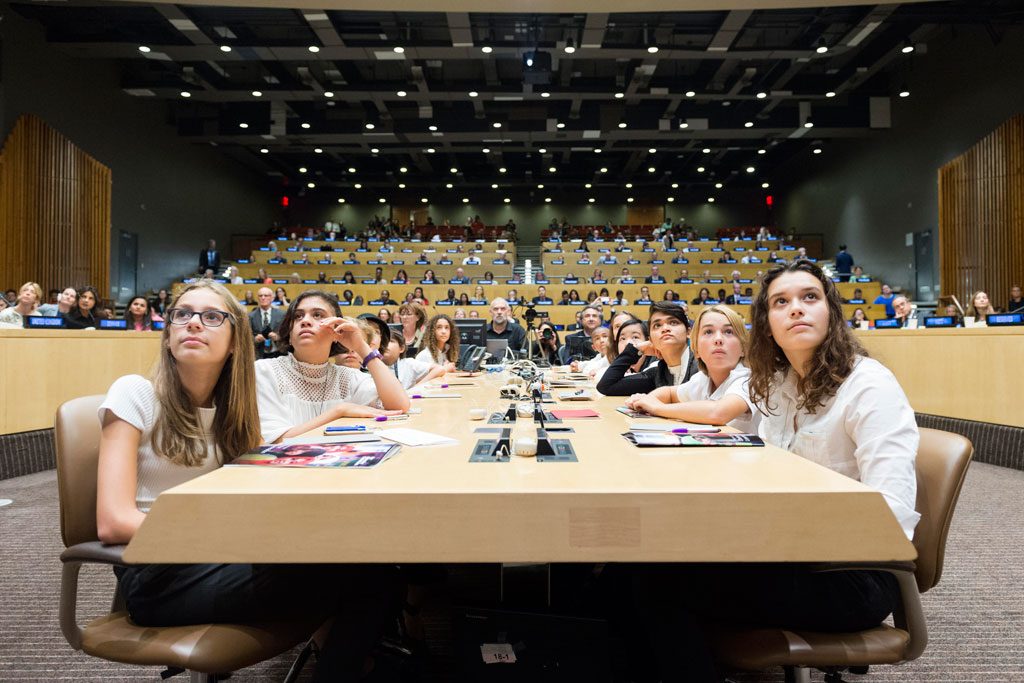
Leaders from around the world assembled at the United Nations this week to debate the way out of new and old troubles and push the agenda for shared peace and prosperity.
But the General Assembly, the largest diplomatic forum, had to grapple with issues like U.S. threats of reprisals against North Korean provocations, the U.S. and Iranian rhetoric over nuclear deal, and Indian and Pakistani fights over Kashmir dispute hitting headlines.
All this happened amid latest setbacks to progress on basic issues like education and human rights. Festering conflicts like Israeli occupation of Palestine and continued denial of democratic rights to large parts of humanity in the Middle East also took a back seat.
Yet, amidst the specters of new wars and back and and forth between countries on some longstanding issues, some figures like Pakistani Nobel Prize winner Malala Yousafzai and Indian actress Priyanka Chopra made appearances at events to highlight the need for focus on issues like education, poverty, hunger, women’s rights and climate change.
“We have big goals, but we will not reach any of them unless we educate girls,” Malala Yousafzai, UN Messenger of Peace said in the face of challenges like widespread discrimination against women and a woeful lack of opportunities.
The UN timed release of a series of studies to highlight some of the pressing issues stopping human development with staggering figures.
About 617 million children and adolescents worldwide are not achieving minimum proficiency levels in reading and mathematics, signalling.
A UNESCO report suggests some 387 million children of primary school age (or 56 per cent) and 230 million adolescents of lower secondary school age (or 61 per cent) will not achieve minimum proficiency levels in reading and math.
Another study says more than 40 million people around the world are victims of modern slavery – forced labor and forced marriage – in 2016. The study says such practices that disproportionately affect women and girls.
According to another report says the number of people hungry around the world is up for the first time in more than a decade, partly due to violent conflicts and climate change.
The UN figures say some 815 million people were hungry last year – an increase of 38 million from the previous year – affecting some 11 per cent of the world population.
But the question remains open: Will the world leaders pay attention to these ground realities and rise up to the challenge? That is a big question for the world beset with real-politicking, major power rivalries, unending conflicts and civil wars.

Financing the Future: Education 2030
Students attending the event. September 20, 2017
UN Photo/Rick Bajornas
And what about the soft power projection on the global forums like the United Nations? Malala, Priyanka, and actress Angelina Jolie have been helping the world body by campaigning for the causes that range from girls’ right to education and support for refugees.
Malala, a survivor of a vicious Taliban attack, has particularly been a massive brand name representing valor and determination against oppression and violence and advocating for children’s right to education. The world leaders and organizations listen to her and her organization has also had some positive results to show in terms of raising awareness and finances in many cases.
Among of a series of interactions she had on the margins of UNGA session, were her meetings with Pakistani and Afghan leaders – representing the possible role of soft power and culture that can bring nations together.
But soft power has serious limitations for corrupt and autocratic rulers and politicians would have none of it when something as good as education poses a threat to their rule. The horrible price the Middle Eastern and North African people have paid for being part of now mostly stifled Arab Spring of revolutions is a stark example.
Similarly, Indian and Israeli occupation of Kashmir and Palestine respectively goes on despite support of all peace loving people for the oppressed.
Then there are world powers that seek to put their interests ahead of all other considerations in pursuit of their foreign policies.
Yet, soft power has lately found a brave new partner in the form of social media. With billions of followers, social media platforms can amplify voices of change and influence public opinion much more quickly and on a much larger scale than any forms of the traditional media.
That also means that more young people are now aware of their rights and possible ways to wage struggle for realization of their goals.
These two factors, in turn, might help in empowering people to speak for their rights in their societies for all reforms spring internally when societies and nations look inwardly.
At the same time, governments through censorship, through misuse and major powers through traditional media manipulation try to influence things their way. The social media has at the same time exposed young minds to negative forces like militant groups and far right and far left violent groups.
Though ever present, competition of narratives built around fear and hope holds incredibly high-stakes for the interconnected world.
So, genuine civil society voices like Malala face a daunting challenge in shaping opinions and policies on issues like international cooperation on issues afflicting the poor countries.
Some analysts caution that in view of entrenched interests of the powers that be, the only way leaders can change destiny of their people if they make get power through democratic means and assume charge of governance. But not all well-meaning people end up in the corridors of power.
That point of view also does not diminish the role of civil society voices. After all some of the greatest movements in recent history were made possible by writers, poets and men of conscience.
The years to come are likely to be defined by a huge struggle between soft power agents – heroes and champions of rights – and the governments on the one hand and on the other an intense contest between the twisted propaganda and inspiring new narratives based on a heightened sense of awareness among young people.















